Passing the Light
18 August 2020 | SDJF_Admin
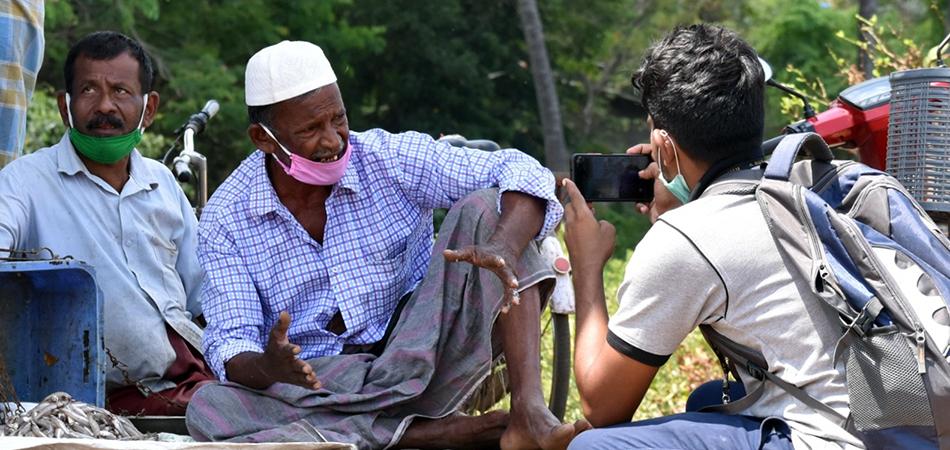
The story of a young man who had Mobile Journalism turned his life around, is now empowering others in his community.
Flashback to August 2018, a group of people are on a pier in mid-day heat, waiting for the familiar sight of the ferry, their ‘moving bridge’ in place of a real one, which would take them to the other side of the river. There is impatience in their eyes, thinking about the chores they need to complete just across the river that for now remains a distant, unapproachable territory. Until the ferry arrives their lives are on a standstill, their bodies exposed to the scorching heat, their minds revisiting the risks of an impending ride across a deep river on an ill-made ferry, risks they have long chosen to ignore in the absence of a safer alternative. These are the people from the two remote villages of Shafinagar and Vethaththeevu, that remain like disconnected pieces of a jigsaw, separated by a giant body of water with a conspicuously missing piece, a bridge.
A young man, separated from the crowd, is busy capturing the scene on his mobile phone, without showing any impatience to join the approaching ferry. He is more focused on capturing the setting and the expressions of the people. Their everyday ordeal has suddenly become an interesting story for him, the story which would be his very first MoJo story. Meet Mohamed Raseem, a young man from Muthur, Trincomalee in the sun-baked Eastern coast of Sri Lanka.
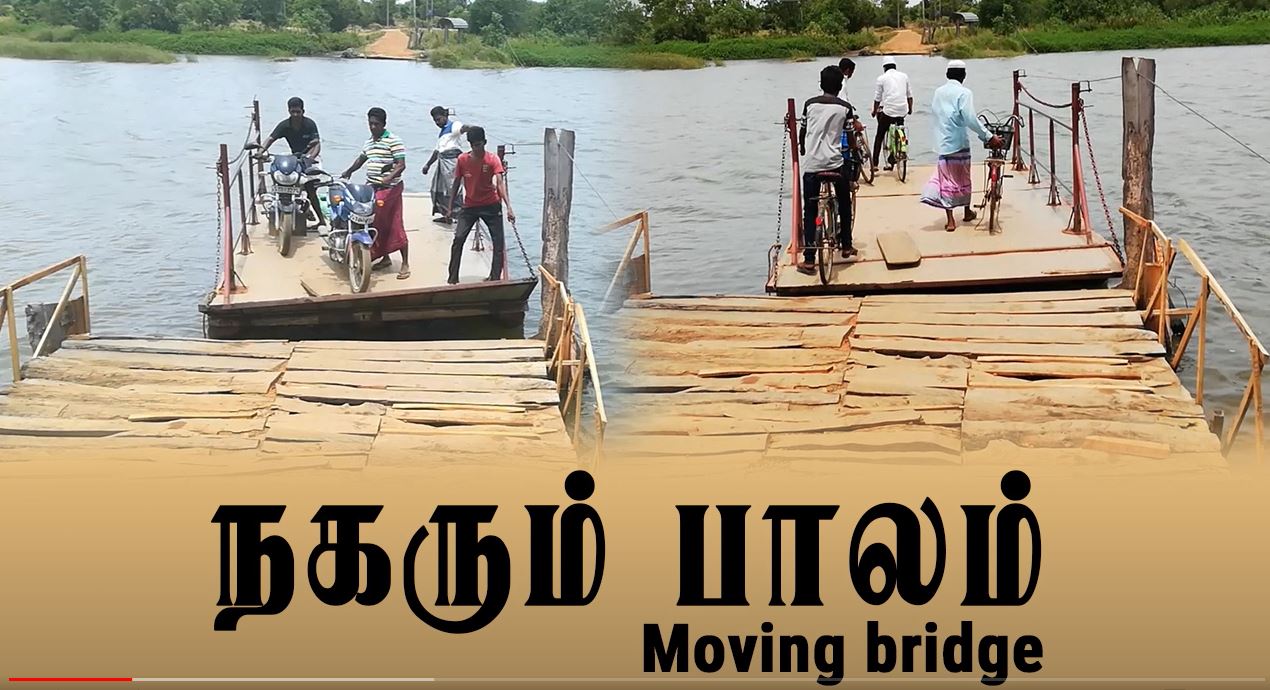
https://www.youtube.com/watch?v=o74ol9Y-uQA&list=PLZuARiJAbp63Kf0JnSA2PED34qtZ_YNz7&index=17
Almost two years later, today he is a proficient mobile storyteller and moreover, a budding Mobile Journalism trainer running a successful first ever video tutorial series on YouTube in Tamil about MoJo video editing. He has produced three tutorials so far and planning to do more.
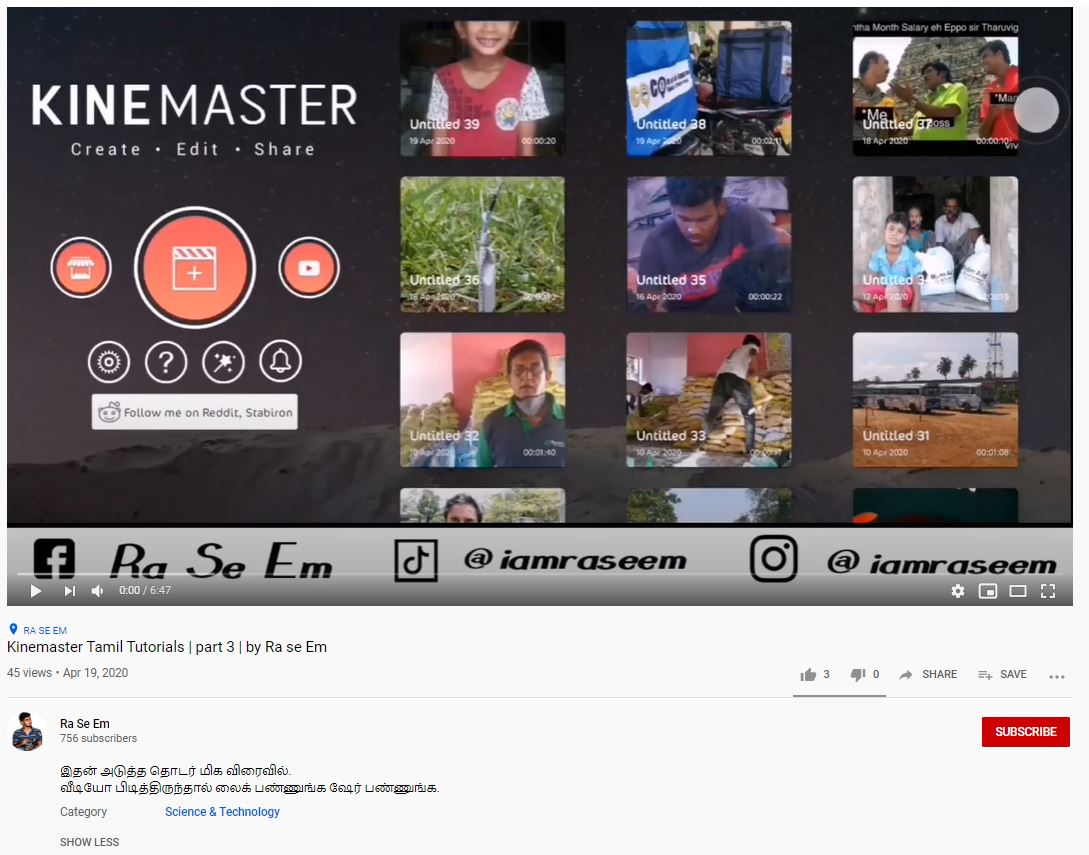
https://www.youtube.com/user/TutorialsByRaseem
Raseem recalls his journey since 2018, “Growing up as a young man, I found myself drawn to photography and videography. After completing my GCE Advance Level exam in 2018, I joined Muslim Aid as a volunteer. One day, a friend showed me an advertisement in the newspaper about a video storytelling workshop organised by Sri Lanka Development Journalist Forum (SDJF). I had never heard never undergone a proper training before, but given my interest in videography I applied for the workshop, curious to learn more.”
Raseem was finally selected for the video storytelling workshop, where he learnt, among other things, the existence of a new tool called mobile storytelling. “I had never heard of MoJo by then but I instantly realized its importance and knew that it was going to take me a long way. Until then I thought that one needed an expensive video camera and many other expensive gadgets to produce a quality video story, but my new discovery with mobile journalism proved that I could do the same with my mobile phone. I decided to look more into it and try it on my own”. His first experiment was the story he did on the ferry connecting the two villages, which was a success. The story made its way to an advocacy campaign coordinated by SDJF related to the video storytelling workshop and it was brought to the attention of the responsible authorities in Muthur. Raseem, fights to date with his community to change the story of the ‘moving bridge’ to a real and much safer bridge.
But like with many aspiring youths, aiming for higher, he did not stop there! “I then started to produce brief documentaries for Muslim Aid Sri Lanka. They were elated and also surprised to learn that they were shot and produced from one single mobile phone. As a result, from being a volunteer, I got a permanent position in the Media and Communications Department of the Muslim Aid. My engagement in MoJo showed signs of turning my life around, for better”, recalls a grateful Raseem.
But his craving to learn more about MoJo was never satiated. When SDJF launched the MediaCorps Fellowship Program for 2019/20 that promised of an intensive training on MoJo, he applied for it, knowing that it was the training he was looking for. By then Raseem had learnt and practiced MoJo by himself, but he knew for a better output he had to learn it under proper guidance. He also wanted to learn more about Journalism to make sure that his MoJo stories are not only technically correct but also bring out a comprehensive, unbiased and ethical story worth telling.
“I might have learnt the basic technicalities of MoJo, but MediaCorps Fellowship was completely a different experience. For five consecutive days we underwent an intensive MoJo training coupled with essential concepts of journalism, including conflict sensitivity, gender sensitivity, social media dissemination and media ethics. It gave me a complete picture of what a true journalist should be. It also added more value to the stories I produced, because earlier I was used to capture mere stories oblivious of its conflict, gender and even ethical implications”. All this happened in a backdrop of ethnic coexistence, where budding journalists from diverse ethno-linguistic backgrounds came together to learn MoJo and to use it for a better cause of giving voice to post-war and marginalized concerns of Sri Lanka. “The fact that it was not just a MoJo training, but a training that served a bigger and better cause of fostering peace and reconciliation, made it all the more interesting”, says Raseem, a youth passionate about promoting peace and reconciliation, who was partnered with two other fellows from Sinhalese and Tamil communities. The triplet collaborated in the months that followed, visiting each other, investigating on the stories of their communities and producing MoJo stories based on their find.
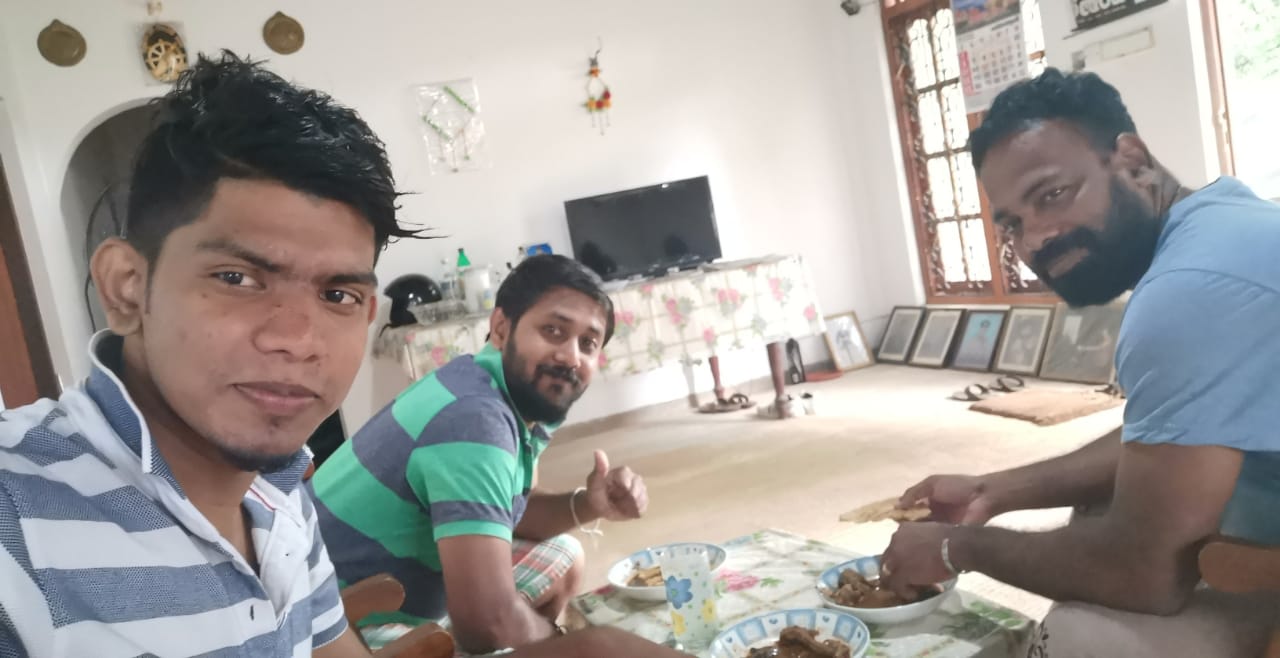
https://www.youtube.com/watch?v=coRanuJ7rGg&list=PLZuARiJAbp60Fy2gG-zlyLXqVXE8xveyS&index=10
Although MoJo is a well-known and widely practiced tool elsewhere in the world, Sri Lanka is yet to reach that status. MoJo is not a popular concept yet, even among the mainstream electronic media in the country. Due to the lack of popularity and practice, there are limited resources available in the local languages for anybody who wants to try MoJo. Raseem had an idea!
With the knowledge gained from the social media session in the MediaCorps Training, Raseem further developed his YouTube Channel, which he had created some time back, with the hope of starting his own tutorial series on video editing using smartphone in Tamil. He noticed there are countless English tutorial series on MoJo on YouTube but none in local languages. “Also, by that time I had posted more than 10 MoJo stories on my Facebook profile which created a regular fan base of more than 900 followers. They appreciated the MoJo videos I made, and wanted to know how I did them. I had many people asking me, which cameras I have used. When I gave them the simple answer that I shot them using my smartphone, they were surprised, because like me in the past, they didn’t know it was possible. They were excited to know more.”
He had the idea brewing inside him for a long time, but with a permanent job that occupied his day, he hardly found time. Then came the global pandemic of COVID 19. As the rest of the world he too was confined within the walls of his home, unable to go to regular work. This gave him all his time to invest in his idea, and to make it a reality. He also knew that as much as he had time to develop the tutorials, many other people were also stuck in their homes, looking to do something productive, something new to learn to keep them engaged during this unexpected self-imprisonment. It proved to be the perfect timing to launch his tutorial series.
“From my own experience, I know that MoJo is not an easy thing to learn. So, I wanted to start from the scratch and to go slowly to make sure that anybody following my tutorials will easily grasp the art and science of mobile video editing. I started from the very basics such as installing the KineMaster App. I didn’t want to rush. The goal was to make the tutorials easy to follow.” His tutorial series seemed a growing success with more people subscribing his channel and by early June, there were 750+ subscribers. Alongside his YouTube channel, Raseem also started a Facebook based news channel named VTV with a few friends. VTV disseminates news and stories based on Muthur and Trincomalee. This Facebook platform also boasts of over 7000 followers with an average, 3000 views per video. Both these initiatives of Raseem have encouraging feedbacks from the followers. “Especially for the tutorials, I receive many positive comments. They thank me for the basic and easily understandable approach I take in the tutorials and urge me to continue the series. I have completed three tutorials to date, with several more to be uploaded in time to come”.
And there was even more! In the wake of the COVID19, SDJF launched a news magazine called the MediaCorps Watch. When people were confined to their homes, unable to go around and see what was happening around the country, SDJF tapped its pool of young journalists from every nook and corner of the country to report ground level stories related to the pandemic. Raseem, upon hearing about the MediaCorps Watch, saw it as yet another opportunity on his way. Ignoring the risk of being exposed to the contagious virus, he went in search of stories in his community related to the COVID19 and produced five stories as a result, all of which were telecasted in the magazine program. Eventually he became the regional reporter for Muthur on behalf of the MediaCorps Watch as well as iVoice, an independent citizen journalism platform hosted by SDJF.
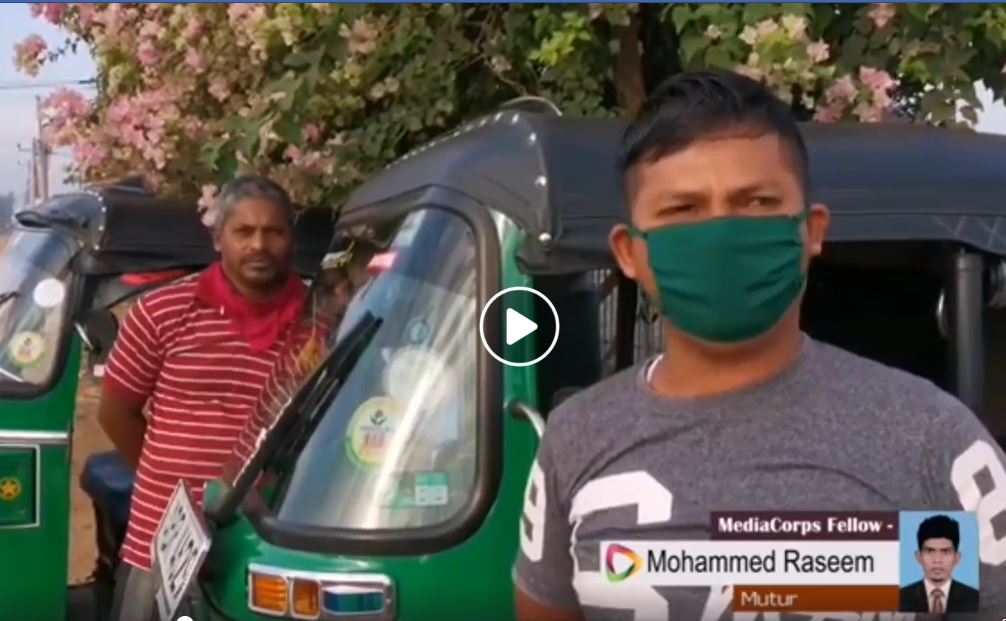
Connect with Raseem on Facebook: https://www.facebook.com/raseemofficial
According to Raseem, the reason he is grateful to SDJF and the MediaCorps Fellowship is not just because it taught him MoJo. He is grateful for being able to find a purpose in his life and a clear journey ahead when he was undecided and unable to decide what he was going to do with his future. “That advertisement about the MoJo training was the turning point in my life as a carefree young man after A/L, without a proper job nor a purpose. Thanks to SDJF and its both trainings, especially the MediaCorps Fellowship. I became a MoJo storyteller and everything in my scattered life and a career fell into place. Today, employed in a globally recognized INGO, I have a secure job that can take me up the ladder, and if not for anything else, I’m doing what I love, the most. The transformation of my own life to who I am today leaves me surprised, while being deeply grateful”.
And just when you think his story ends with that grateful note, he has even more inspiration to add. “This is not just my story. There are many more out there like me, especially far from the comforts and opportunities in the city. There are many like me who are struggling to decide what their future might be. Not everybody gets into higher education, but I don’t believe life can end there. New skills like MoJo can shed light into the lives of those like me who are into journalism, photography, videography and even film-making. That is why I believe they also deserve this wonderful opportunity that I received. And that’s what I’m trying to do now. I was empowered when I was desperate, now I empower others. I’m passing the light that I received, to others who are yet in the dark”.
The MediaCorp Fellowship Program is implemented by the Sri Lanka Development Journalist Forum (SDJF) in partnership with the International Research and Exchanges Board (IREX) and the support of USAID. The Fellowship has trained 112 young journalists from different ethno-linguistic and geographic settings by the end of February 2020, who have had a unique cultural experience in each other's communities and produced more than 200 multimedia stories.
By- Hasarel Gallage